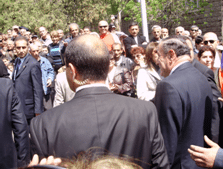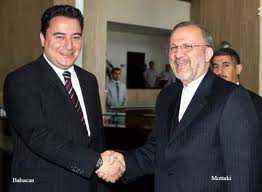 May Day is a pagan ritual which marks the end of the colder winter half of the year in the Northern hemisphere, and it has traditionally been an occasion for popular and often raucous celebrations – ‘regardless of the locally prevalent political establishment’. But not for Levon Ter-Petrossian, his Mayday was more akin to the Mayday associated with the emergency code word used internationally as a distress signal by ships and airplanes in radio communications; derived from the French venez m’aider, meaning ‘Come Help Me’; the Mayday used to signal a life-threatening emergency by groups such as police forces, pilots, fire-fighters, and transportation organizations – and LTP.
May Day is a pagan ritual which marks the end of the colder winter half of the year in the Northern hemisphere, and it has traditionally been an occasion for popular and often raucous celebrations – ‘regardless of the locally prevalent political establishment’. But not for Levon Ter-Petrossian, his Mayday was more akin to the Mayday associated with the emergency code word used internationally as a distress signal by ships and airplanes in radio communications; derived from the French venez m’aider, meaning ‘Come Help Me’; the Mayday used to signal a life-threatening emergency by groups such as police forces, pilots, fire-fighters, and transportation organizations – and LTP.
Yesterday, LTP’s Armenian national Congress (ANC) liner was visibly in distress, suffering relentless buffeting from an Armenian regime which terrorized and killed itself into office; which runs a state-imposed lawless society, holds democratic opposition supporters in prisons, and bullies and beats correspondents who try to tell the story. LTP has finally been trumped by the ‘Flying Ace’ which Kocharian has for years kept tucked up his sleeve and which Sargsyan now flaunts with his international partners-in-crime; the ace of capitulation – on Karabakh and on Genocide.
Nevertheless, the regime had prepared well for a potentially massive turnout, which might have been the case. But, according to Levon Zurabyan, vehicles bringing LTP supporters to the meeting from outlying regions were turned back in traditional regime style by security services at the city limits brandishing automatic weapons. In contrast, outgoing vehicles were encouraged to take their Mayday holidaymakers to tend their plots of land in the countryside.
So LTP had fewer passengers than for previous voyages, with the business class notable in its absence. They are distancing themselves from LTP and jumping off his democracy liner, now looking for a Sargsyan lifeboat, in the hope that after regime cronies have finished pillaging the multi-billion dollar [economic rescue] Genocide /Karabakh ‘Sell-Out’ package, the leftovers will help to rescue their small and medium business enterprises. The three thousand or so economy class passengers left on board were seeking cover in whatever sheltered place they could find, realizing they were doomed to go down with the ship and its captain. Riot police were on display in abundance as usual, with bus loads of reserves waiting in the surrounding streets, to make sure nobody jumps ship.
The Turkish press was eager to quote the international AFP, which rushed to report on how LTP announced to his 3,500 supporters that he and his Armenian National Congress are “in favor of the soonest settlement of Armenian-Turkish relations and is ready to support all positive steps.” On this occasion, the Armenian press came to rescue, with Onnik Krikorian, one of Armenia’s last ‘independent’ photo-journalists, using his Global Voice to report the truth of the matter and including the following:
“In a damning indictment of Armenia’s rapprochement with Turkey, opposition leader Levon Ter-Petrosian accused President Serzh Sarkisian on Friday of scuttling U.S. recognition of the Armenian Genocide and gaining nothing in return …… We are left to conclude without the slightest exaggeration, that for the sake of prolonging his rule, Serzh Sarkisian has literally ‘Sold Out’ the Genocide. “His next step will undoubtedly be a ‘Sell-Out’ of Karabakh, after which he will become the first Armenian to win the Nobel Prize.”
Unfortunately there is now little hope for an LTP rescue effort, a multi-billion dollar carrot, backed by the power of the international propaganda machine, has succeeded with its ‘Weed Revolution’ for Armenia.
The international community has happily fallen for the Kocharian / Sargsyan ‘Flying Ace’, hailing marvellous Sargsyan achievements with Turkish and Azerbaijani relations. The European Union started the bidding and gambled the virtues of democracy, the rule of law and human rights. But realizing that Sargsyan was not fooled by the bluff, it instructed PACE to throw in the hand, and they joined Sargsyan as co-conspirators.
America then upped the anti with a billion plus dollar cash WB/IMF bet, a calculated bid to draw the ‘Flying Ace’ and knowing it had a win-win situation. Upping the stakes would either call the Sargsyan bluff, with the US collecting the pot, or US losses would be recouped by Obama reneging on his promise to recognise the Armenian Genocide on the 24th April.
Moscow put in its half billion dollar bid in typically shrewd Russian style, reminding the Armenian party that in the event of losses, they would be covered by previous Russian / Armenian agreements. Turkey and Azerbaijan stayed in the bidding with promissory notes, watching the major players jockey for position. Then the US threw in its billion dollar hand and Obama reneged on his Genocide promise as planned.
The players have been at the table for months on end, each ready to back out in return for resolving its problems in the Caucasus. The EU and the US were happy to cut and run to leave the three former Soviet players to finish the game, each hoping that Turkey, which has been picking up strong cards along the way, will not come up with a hand to trump them all.
Armenia still has a better-than-even chance of raking in the entire multi-billion dollar pot; all it has to do is to call the Turkish Azerbaijani bluffs and pick the right time to throw down its Karabakh card. The Republic will then be endowed with an internationally installed bandit regime, which for many generations to come will dictate life in Armenia – and all for the sake of a treacherous Armenian capitulation on Karabakh, which unfortunately included an even more shameful ‘Sell-Out’ of the Armenian Genocide.
In typical style, whilst Diaspora Armenians have been lobbying overseas, Armenians in the Republic have been subserviently watching on as this process moves into its final stage. The fifty or so thousand Karabakhis are up in arms, determined to defend their rights in the light of this Kocharian / Sargsyan ‘Sell-Out’. But there is little hope that they will be able to stop the capitulation roller-coaster, when Armenia’s regime unilaterally withdraws its troops from five of the surrounding territories, egged on by Bryza and his Minsk associates and rubber stamped by the EU.
The tale goes that when the Azerbaijani Defense Minister asked his President if he was prepared to take Karabakh by force, Aliyev answered – “Are you crazy, there are fifty thousand of them”. The Defense Minister answered but we are a country of eight million and our army is several times larger in number than the entire Karabakh population and we have spent billions of dollars on the latest military equipment. Aliyev replied: “But two Karabakhis took over Armenia single-handed and now they own the Republic. Imagine what fifty thousand of them will do to us!”
After the Sargsyan ‘Sell-Out’, Turkey and the rest of the international community will be pleased that that anecdote is now the reality. Unfortunately, it is the reality with which Armenia now has to live – and Armenia, you can blame absolutely nobody for it – except yourselves.







 May Day is a pagan ritual which marks the end of the colder winter half of the year in the Northern hemisphere, and it has traditionally been an occasion for popular and often raucous celebrations – ‘regardless of the locally prevalent political establishment’. But not for Levon Ter-Petrossian, his Mayday was more akin to the Mayday associated with the emergency code word used internationally as a distress signal by ships and airplanes in radio communications; derived from the French venez m’aider, meaning ‘Come Help Me’; the Mayday used to signal a life-threatening emergency by groups such as police forces, pilots, fire-fighters, and transportation organizations – and LTP.
May Day is a pagan ritual which marks the end of the colder winter half of the year in the Northern hemisphere, and it has traditionally been an occasion for popular and often raucous celebrations – ‘regardless of the locally prevalent political establishment’. But not for Levon Ter-Petrossian, his Mayday was more akin to the Mayday associated with the emergency code word used internationally as a distress signal by ships and airplanes in radio communications; derived from the French venez m’aider, meaning ‘Come Help Me’; the Mayday used to signal a life-threatening emergency by groups such as police forces, pilots, fire-fighters, and transportation organizations – and LTP.